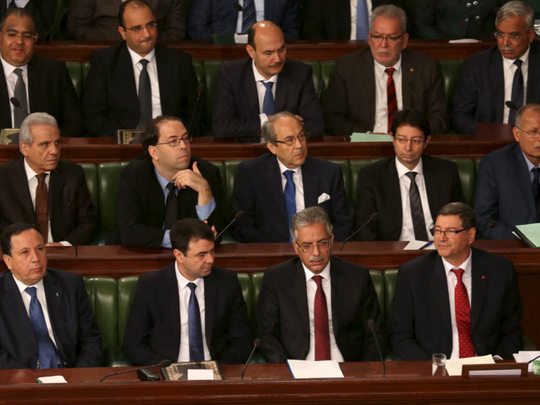
Tunis: Tunisia’s main Islamist party, Al Nahda, re-emerged as the dominant faction in Parliament on Monday as mass defections from President Baiji Qaid Al Sebsi’s secular party continued, largely to protest his son’s position as party chief.
The upheaval in the governing party, Nidaa Tunis, just over a year after it defeated Al Nahda in parliamentary elections and swept Al Sebsi to power in a presidential vote, had been brewing for months.
The splintering is not expected to bring down the coalition government that Nidaa Tunis leads, but it is likely to complicate politics, including the confirmation of a new Cabinet, which Parliament voted through on Monday evening. The lawmakers kept their seats in Parliament but are unaffiliated with a political party for now.
Tunisia has been praised for its democratic progress in the five years since a popular uprising overthrew the dictator Zine Al Abidine Bin Ali, inciting the Arab Spring. But it has had five governments in as many years, and many political parties have struggled to find a firm footing.
The mass resignations from Nidaa Tunis began with several founding members, who complained that the party had strayed from its original goals. Among the most prominent is Mohsen Marzouk, who assumed the presidency of the party briefly last year.
Twenty-eight members of Parliament from Nidaa Tunis had resigned by Monday, according to Bochra Belhaj Hmida, a prominent member who resigned.
An additional 42 members of the party’s political bureau also resigned, members announced on Sunday.
The resignations reduce Nidaa Tunis’ seats in Parliament to 58, while Al Nahda holds 69.
Marzouk and many others said their resignations did not represent a withdrawal of support for the government or the president. Rather, they signalled opposition to the move by the president’s son, Hafedh Caid Al Sebsi, to take over the party and try to create a dynastic transfer of power.
Marzouk, a longtime left-wing political activist who spent time in prison under the dictatorship of Habib Bourguiba, is largely credited with masterminding the electoral success of Nidaa Tunis and Al Sebsi.
Amid popular criticism of Al Nahda, Nidaa Tunis drew widespread support for its secular stance for a modern democratic state. Yet divisions were evident from the start. The elder Al Sebsi drew support from groups on the left and the right, including supporters and opponents of the former dictatorship, and even he has not been able to keep the party together.
Marzouk told hundreds of supporters at a rally in Tunis on Sunday that he had left the party not because of personality clashes but because the party had lost sight of its vision to build a democratic, modern and secular state. Accompanied by 17 deputies who had already resigned from Nidaa Tunis, he said that he particularly opposed the coalition with Al Nahda and that he would announce the formation of a new party on March 2.
Marzouk said he and the deputies would not serve in the government or join the opposition.
Other members were more outspoken in placing blame for their departure on the assumption of power by the president’s son.
“We are not against his person,” said Bin Ahmad Mustafa, a former parliamentary deputy and member of Nidaa Tunis’ political bureau, “but against the political power he acquired in an illegitimate way and against his practice of exclusion of those who have a different opinion from him.”
The break came as Nidaa Tunis held its first national party congress in the town of Sousse over the weekend. At the meeting, the younger Al Sebsi was named national secretary in charge of the executive administration and legal representative of the party, which hands him the reins, the national daily newspaper La Presse reported. The party presidency remains unfilled.
Hmida said many party stalwarts had been sidelined as newcomers had muscled in. She said she attended the party congress in hopes of reaching consensus.
“We were there until the last minute hoping to readjust the path of the party,” she said in a telephone interview. “But unfortunately this small group wants to not only be in control of the party, but also of the state.”
She and six others issued a statement of resignation on Monday, protesting the “horrible outcome” of the congress. “There’s a clear coup against the road map that we in the committee of consensus tried to apply,” the statement said.












